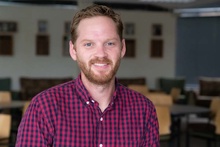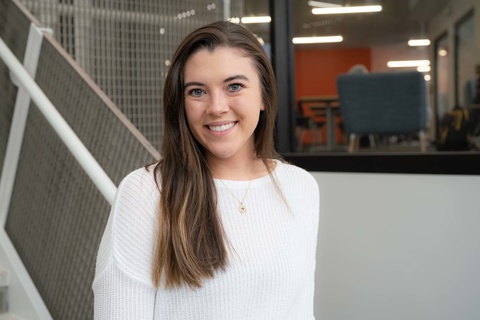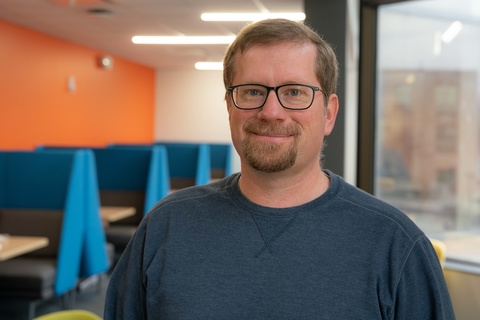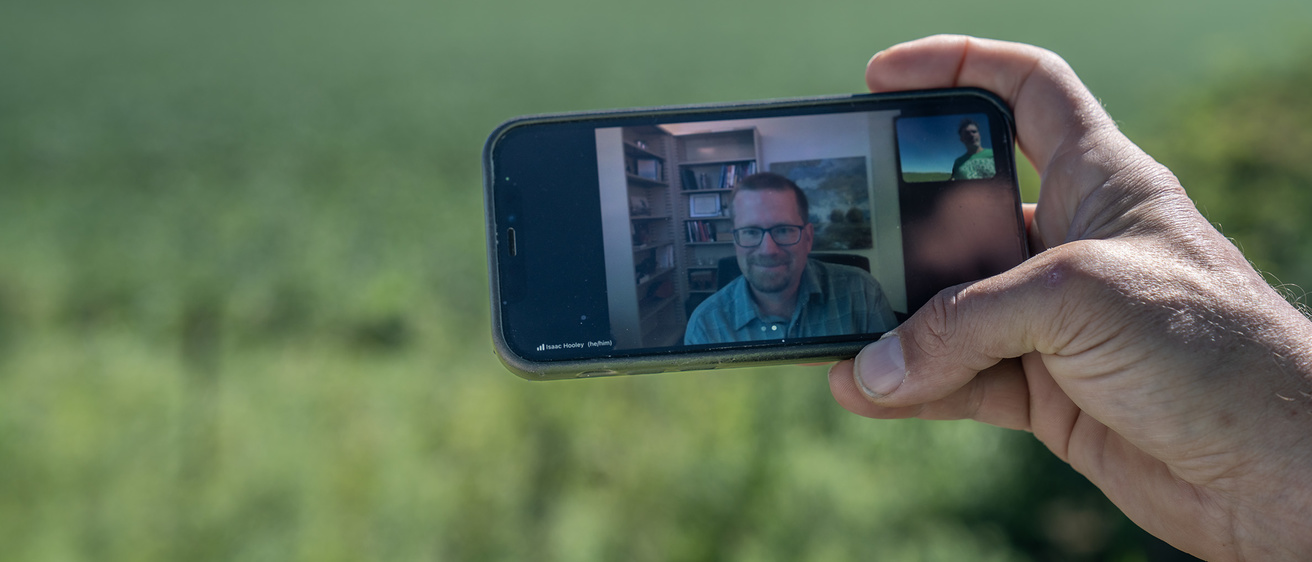
podcast featuring the
Telepsychology Training Clinic.
For many, the idea of rural Iowa conjures images of acres of green corn and soybean fields, dotted by the occasional tiny town with little diversity and an aging population.
In reality, rural Iowa does not fit one simple definition. Filled with old and young, liberal and conservative, farmers and factory workers, as well as different ethnicities, sexual and gender orientations, and life experiences, each rural Iowa town is unique and has its own set of issues, character, and needs.
The Telepsychology Training Clinic (TPTC) at the University of Iowa College of Education was created to serve these communities and their unique needs, bringing comprehensive mental health care to these rural Iowa towns.
“I came into this thinking that if we are serving rural clients, we would be serving white, cisgender, agriculturally

based clients, and that has been far from the truth of the communities that we have been serving and collaborating with,” says Martin Kivlighan, TPTC co-director and associate professor in counseling psychology. “We have a problem with who we inherently see as an Iowan. With this training, it helps broaden our scope of who is an Iowan and who has been rendered invisible. We can’t serve all Iowans if we’re not seeing all Iowans.”
The TPTC partners with the University of Iowa Mobile Clinic, the University of Iowa Hospitals & Clinics Opioid Addiction Clinic, and several other community partners to provide free mental health care to uninsured and underinsured rural clients.
Created by Kivlighan and fellow counseling psychology faculty members Saba Ali, and Charles Bermingham prior to the COVID-19 pandemic, the TPTC set out to become one of the few telepsychology training clinics in the country. While COVID made telepsychology common, the TPTC still provides unique training in virtual mental health counseling for rural Iowans.
“We knew pre-pandemic that telepsychology was going to be big and we started thinking about how we can give training experiences for our students and serve rural communities. We can’t always send our students to rural communities and have them driving all over Iowa,” says Saba Ali, associate research dean and professor in Counseling Psychology.
Increasing diversity, addressing lack of mental health services
The goal of the TPTC is two-fold: attract diverse students from underrepresented backgrounds and train them in high-quality, ethical, telemedicine and address the lack of mental health services in rural Iowa.
“One of the big goals of this work is to recruit and train diverse students who are underrepresented in our field, and then to be able to shine the spotlight on what rural spaces look like,” says Kivlighan. “Across the state there is a shortage of psychologists, but there are towns and communities across Iowa who might not have any services or providers. That’s where we are really able to provide something from here at the University of Iowa to the larger state.”
Many rural Iowa communities face substance use issues, economic strife, loss of opportunity, and more, all while lacking access to the critical mental health services of urban and suburban communities.
According to the Centers for Disease Control and Prevention, in 2020, Iowa saw a nearly 20% increase in deaths resulting from drug overdoses. While deaths related to prescription opioid overdose has leveled off, deaths from heroin and synthetic opioids have increased.
The Iowa Department of Public Health reported that fentanyl and other synthetic drugs have been implicated in 87% of all opioid overdose deaths.

Increased stigma around substance use further isolates people in rural communities in need of help, says DorisAnn McGinnis, doctoral student in counseling psychology.
“I think something that’s often forgotten is substance use disorder and opioid use disorder is mental illness. Seeking help for mental illness should never be stigmatized,” says McGinnis. “If you think about a person who has depression or anxiety by and large, those kinds of struggles are much more accepted.”
Despite often being viewed as a personal choice, substance use disorder is classified as a mental illness by the National Institute of Mental Health, and largely result as a coping mechanism from environmental stress and trauma.
About half of people who experience a mental illness, like anxiety or depression, also will experience a substance use disorder in their lives and vice versa, according to the National Institute of Health.
McGinnis says substance abuse often begins in adolescence. McGinnis remembers working with a client who began using drugs at age 13 after she was given drugs by her mother.
“My clients often describe how substance use was a way for them to cope with traumatic environmental experiences that were out of their control. When substance use starts at such a young age and it is the only resource they have for coping with trauma, it becomes a habit or a pattern,” says McGinnis. “It’s often easy for us to say that it’s an individual choice to use drugs or alcohol but the situation where people find themselves using drugs is incredibly complex.”
In addition, rural communities are facing loss of infrastructure and economic opportunity. Isaac Hooley, former TPTC director of clinical services, says that when rural communities experience closing businesses, job loss, and urban flight, community members often experience an emotional response.
“For communities that are dwindling as they see jobs leaving and infrastructure leave, there’s feelings of abandonment and fear and that can generalize to relationships and work and family life. I think that loss of capital affects a lot of communities in Iowa, says Hooley. “Often people feel far away from resources and isolated- it can be really hard to seek mental health support.”
In 2020, 68 of 99 Iowa counties lost population according to the Census Bureau. With population loss, essential infrastructure like schools and hospitals are at risk for closing, creating further job and population loss.

Ali says an aspect of TPTC training focuses on looking at communities holistically, not just individual clients.
“We never want to lose sight of the fact that people are part of bigger communities. We can’t just focus on changing the person, you also have to figure out how to be impactful in the community,” says Ali. “We are all part of something bigger. When everyone around you is thriving and the economy is thriving, you are going to thrive too.”
Rural communities also face a devastating lack of mental health professionals. The Iowa chapter of the National Alliance on Mental Illness says that more than 1.8 million people in Iowa live in a community that does not have enough mental health professionals.
“Iowa’s lack of psychologists is critical. Across the board we are seeing low numbers of licensed psychologists and mental healthcare workforce,” says Kivlighan. “Then when we look at psychologists who are trained specifically in substance use, opioid use, and prevention and treatment, those numbers get cut in half.”
Kivlighan says that the use of telepsychology can help ease the burden that this lack of access causes, helping people who don’t have the resources to travel long distances for mental health care.
“Before the pandemic, when we were face to face for group therapy, some of our group members would travel two and a half hours both ways just for a 90-minute therapy group.” Kivlighan says. “Not everyone can do that. So being able to harness technology so those people can access services more easily and those who weren’t able to travel can access the services is huge.”
The clinic is also unique because its services are completely free of charge, which allows them to serve uninsured or underinsured Iowans. The Iowa chapter of NAMI says that Iowans are more than two times more likely to be forced out-of-network for mental health care than primary care, making it less affordable and more difficult to find care.
“A lot of the clients we see are uninsured or underinsured and work in jobs that do not provide health insurance,” says Hooley. “There are resources that the state provides, but there are extra hurdles of filling out forms and meeting with your case worker. It’s not as easy as just meeting with a counselor to talk about the stressors in their lives.”
Therapists often are required to provide a diagnosis to clients for insurance purposes. Because the TPTC is completely free, they do not have the same constraints.
“We’re not focused with providing every client with a mental health diagnosis. While there may be times where it is appropriate, many clients might not meet criteria for a mental health disorder, but that doesn’t mean they won’t benefit from counseling,” says Hooley. “We can be solution-focused and often that means just providing a space where a person feels heard and supported as they think and feel their way through challenges in their lives.”
Resilience despite challenges

While telepsychology allows more Iowans to receive care, Hooley says it is not a perfect solution to the lack of access Iowans face.
“One big challenge we’ve experienced is that the internet and technology can be unpredictable. Folks usually know where they can go to get internet, but that is often in public spaces like outside of a library,” says Hooley. “That’s a different experience to meet with a therapist in your car parked in a public place, rather than in a space that might feel more private.”
The TPTC remains dedicated to providing high-quality care in any way possible to navigate these challenges.
“We try to prioritize access. If we need to deliver services over a landline instead of using video conferencing, we’re going to do it. Otherwise, that patient isn’t going to receive care,” says Kivlighan.
The clinic is funded from a Health Resources and Services Administration Graduate Psychology Education federal grant spanning six years (2019-2025) and totaling nearly $2.7 million dollars.
The TPTC staff and trainees are grateful for this federal funding that allows them to provide care to Iowans who need it most. Without this federal funding, these essential services would be inaccessible to many rural Iowans.
“Federal funding is how we can do this and provide care for free. If we don’t have the resources to fund the clinic, then we don’t have the resources to help people,” says McGinnis.
Despite the challenges rural Iowans face, their communities are still filled with beauty and hope.
“I am also so impressed by the resilience and strength that clients bring. Sometimes I hear this narrative that rural people are anxious and angry, but that isn’t the whole story,” says Hooley. “I continue to encounter strength and energy and creativity in rural people and communities, and this is also part of what it means to be a rural Iowan.”
Hear from the TPTC team in our Office Hours podcast on Soundcloud.
Read the transcript.
See more from the Annual Report
